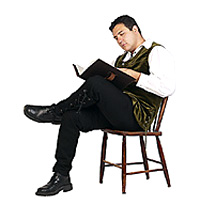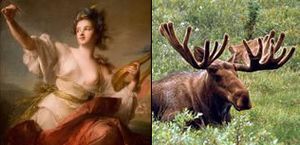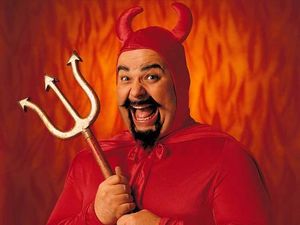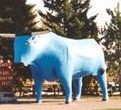Literature
“What the Dickens?”
“Cliff Notes is Literature! It's LITERATURE!!”
“It's a type of math right?”
As the generally accepted definition of literature today hugs folktales to its warm bosom, we might well conclude that literature began with one frightened caveman grunting (see language) his fears to his fellows by firelight. This, however, would be wrong. Scurrying, short and bitter academics in dank bare cells have clinically proven that 'literature' is caused by writing down things which never happened and which afflict the reader with acute boredom , in some cases literally boring the victim to death.
Today, the study of literature remains a major academic discipline at nearly every educational institution around the world, often being the most heavily required class for graduation. This is because academics have declared that finding themes (which the author totally intended to put in the work) is far more important than learning first aid, basic home and auto repair, or how to do your taxes. However, there is one major benefit to the study of literature: without it, as many as half of the jokes in your favorite TV shows would fly right over your head.
The Genesis of Literature[edit | edit source]
To find the beginnings of literature, we must, therefore, lurch forward several tens of thousands of years to the time of the ever-popular cuneiform script and the angry Linear B script which produced epic works that were set down in the semi-permanent bedrock of the post "Watch me bang on a rock with this chisel" era. The first literature was the epic poetry (see The Iliad , The Odyssey, see also Trojan War) written Homer, a particularly impressive feat since Homer was not only blind,
but was also illiterate. This accounts for the fact that his work was recorded and preserved by Brad Pitt in the form in which it has come down to us today. Before Pitt became his amanuensis, Homer was known for walking all over ancient Greece reciting his poetry. These recitations would take days to complete; whole villages fled in terror at Homer's approach. Homer was eventually imprisoned and was condemned to death by drinking hemlock. As we shall see death or at least imprisonment was often the penalty for exceedingly bad writing in the past and continued to be so until the 18th century.
Homer's contemporary and former roommate, Gil Gamesh, chiseled the Epic of Gilgamesh and, as one of its most sympathetic critics has written, "this tedious, odious poem remains one of the least read and most hated texts of all time." Gamesh subsequently attempted to sue The Bible/God for copyright infringement of the story of the Flood, but was unsuccessful as there were no courts at the time. (No doubt the reason he was never imprisoned is that in Sumer, where Gamesh wrote his epic, there were no prisons at the time either.) The Bible itself is one of the first and best-known works of literature, featuring the mad-cap adventures of God, Satan, Adam and Eve, Noah (seeSmiting), Moses, Jesus and many, many more.
However, that is only part of the actual genesis of literature. The other part of it was that it was first thought of for insomniacs. Insomnia is the state of being unable to sleep, but this remedy, called literature by people who loved naming things for some reason, cured insomnia almost completely! Soon, though, people with mental illnesses started to find joy in the insomniacs' remedy, and this led to the forcing of others to try to enjoy it, but this attempt at forcing the whole world to enjoy it never succeeded. Today, these people with mental illnesses, whom we now call English teachers, still embark on that never-ending quest at forcing the world to appreciate literature for what they think it is, but we normal people still find it the best remedy for insomnia.
The History of Literature[edit | edit source]
The Dark Ages[edit | edit source]
After the first outbreak of poetry in the ancient world, there was a long period known as the Dark Ages of literature. It was so-named because reading the literature of the Dark Ages is like stumbling around in the dark for ages and barking your shins on the furniture repeatedly. Mercifully, most of the literature of the Dark Ages was written on mead-soaked parchment and thus was later was eaten by Wombats. The best-known extant work of this period is the Icelandic saga Beowulf written by Ethelred the Unread, a distant relative of Ethelred the Unready (see Vikings) which, although it received scathing reviews from critics at the time, later became the inspiration for the more widely-known Victorian classic, The Flintstones . Most poetry of this period, such as Four Norsemen of the Apocalypse , was written by Anonymous and depicts slaying, drinking mead in castle halls, slaying, the occasional monster or dwarf, and more slaying. It is believed that Ethelred the Unread, and Anonymous were both imprisoned for the crime of " Wrytings Most Foule." Another writer of this period, Boethius wrote the Consolation of Philosophy in 524. It was promptly forgotten for the next 1,440 years until, in a strange quirk of fate, Merv Griffin stumbled upon it and used it as the model for his long-running cash-cow quiz show, "Wheel of Fortune". (Boethius wrote the Consolation of Philosophy while he was imprisoned and he was later executed in a horribly painful manner.) Dark Ages literature is known to be toxic, even to philologists (see philology) wearing haz-mat suits, but due to the fact that is it written in Old Norse (see Norse), and Aeld Aenglish (see Old English), the general public is currently deemed to be safe from its effects.
The Middle Ages[edit | edit source]
The undisputed literary masterpiece of this period is Dante's epic poem,The Divine Comedy . Paradoxically, The Divine Comedy is probably the most un-funny work in all of Western literature. In recognition of his genius, Dante was awarded the Golden Flame award for Angriest Poet Ever in 1393. Literary critics generally agree that Dante's extreme spleen can be credited to the fact that in 1375 he was literally dragged through Hell by fellow Italian epic poet, Virgil . While recovering from this harrowing experience, Dante wisely decided to take those lemons and make lemonade out of them, and he subsequently wrote a travelogue, The Inferno , which became a best seller. Dante was thus able to indulge his legendary hatred of nearly everyone in Italy and several nearby countries by inventing punishments for them in Hell that give new meaning to the phrase "going medieval on his ass" and including them in his poem. In a major lapse of judgment, Dante later wrote two other poetic sections: Purgatory , not knowing that the Pope would later shut it down, and Paradise. Sales plummeted. Although he never actually served jail time, Dante was exiled for life from his native city of Florence and condemed to death in absentia by burning at the stake.
Late Middle Age[edit | edit source]
The next great age of literature was Late Middle Age which saw a large number of knee replacement surgeries, a sharp increase in the use of Viagra and the penning of The Canterbury Tales , (also see Cantorbury Tales), the inspiration for countless road trip movies of that era. The author, Geoffrey Chaucer , unfortunately wrote his verses in Middle English and so their meaning is today an enigma over which scholars still club other with large, blunt objects during their frolicsome debates. Fragments of the Naughty Bits of The Canterbury Tales have been carefully preserved and lovingly handed down over the centuries, but in recent decades porno has become so widely available that scholarship in this area has declined precipitously. Chaucer was briefly imprisoned in 1350 and was thereafter known as "the prisoner." A little-known fact is that Chaucer was an accomplished musician and composer. His musical compositions were far ahead of their time and did not become popular until centuries later, but two of his songs became twentieth-century hits: She's Only a Bird in a Guilded Cage and Do the Mess-Around. Interestingly, Chaucer was best-known to his contemporaries not for his poetry, but for his prize-winning kumquats and his fierce attachment to bushbabies.
The Renaissance[edit | edit source]
This period saw the emergence of The Faerie Queene, possibly the most allegorical and gay of all epic poems. Sir Wigbert Throttlebottom penned this work in the time of Elizabeth I and dedicated it to her, having created the Faerie Queene character, Gloryoski, as a thinly veiled, albeit highly idealized portrait of Queen Elizabeth . Many scholars see The Faerie Queene as the most egregious case of sucking-up in all of literary history. Depicting the eternal struggle of good versus evil, The Faerie Queene is generally considered the most mind-numbing and stultifyingly boring work in English literature: an astounding feat, considering the competition. There have been many class-action lawsuits brought against Throttlebottom for pain and suffering caused due to exposure to this poem; However, none of these lawsuits have prevailed because the author had the foresight to include a warning label on the cover of his work which has been judged to protect him against any legal action, despite the fact that he clearly wrote The Faerie Queene in Ye Olde English , evidencing malice aforethought. This legal protection is probably the reason why Throttlebottom never served time in prison.
Post-Modern Renaissance[edit | edit source]
During this time, Sir Kevin Bacon wrote the plays which are widely considered the apex of English literature. The versatile Bacon wrote tragedy, comedy, history, pastoral, pastoral-comical, historical-pastoral, tragical-historical, and tragical-comical-historical-pastoral dramas in iambic pentameter, the style which clearly still dominates the world of literature today. Bacon's dramas deal with the core issues of the human condition and, as such, they remain as relevant today as when they were written. Many of his plays have been made into hit movies in recent decades. The most recent was Bacon's comedy, Shakespeare In Love. Bacon's most famous play, HAM-lette, (also known as Hamlet) clearly evidences the pork-influenced genius that has transformed the world of theater world-wide. Ironically, Bacon was a vegetarian, and he was ultimately beheaded for his heretical dietary practices. He was also known to be inordinately fond of Marmalade . Bacon created a world of royalty in every play and thus was able fulfilled his desire to be the king in his fanciful imagination.His plays are famous for portraying royalty,royalty and only royalty [little of nobility sometimes] and no space for common Man.
On a side note, this was also the age of the the Metaphysical Poets whose greatest hit, Let's Get Metaphysical, was later covered by Olivia Newton John. The group Andrew Marvell and the Marvelettes were also very popular during this period.
Restoration[edit | edit source]
A little-known and very touchy literary period, it is proudest of John Milton's epic poem Paradise Lost . Milton felt the Biblical story of creation left a lot to be desired, so he penned what he referred to as "a more fun version." Critics have long advanced the view that Milton was "unknowingly of the Devil's party" because Satan and his cohorts were so much more interesting than the pompous, blow-hard God of his epic. Milton's response to this literary thesis: "So sue me!" Legal action, however, was never taken since no one could ever stand to read past Book One. Millton was, however, imprisioned during the Restoration and all his writings were ordered to be burnt. Many, unfortunately, survived, including Paradise Lost.
Also reflecting the religious tenor of the times, the other major literary work of this period was Paul Bunyan's allegorical tale Pilgrim's Progress, the tedious story of the seemingly endless voyage of "The Mayflower," whose passengers sought freedom of lumberjacking and Babe worship in the New World. (No, not babes,you moron! These people were Puritans! Babe worship. No! No! Not The Babe! Baseball hadn't even been invented
yet, for crying out loud! No, not just a babe either. It's Babe, and he's an animal not a person. No, not Babe the pig, Babe the Blue Ox. That's right, blue. Yes, I know what I'm talking about. For Christ's sake! Just look at the picture over there, will you? No, not the one on the right. Does that look like an ox to you? Yes, he has horns, but does he look like a blue ox? Look at the picture on the left.......... Now, where was I?......... What! You again! For the love of God! Can't you see I'm in the middle of something here? OK, look, I'll make a footnote for you down at the bottom that will answer all your questions, all right? Yes, right before you get to "See Also." Now go down there and LEAVE ME ALONE! ......Jeeeez! Of all the brain-dead nimrods..............So, where was I?.........Ah,yes........) Although it tended to induce comas in many readers, Pilgrim's Progress still received rave reviews from critics of the era for its groundbreaking style of not-a-poem writing. Bunyan was imprisoned on numerous occasions. He wrote the first part of Pilgrim's Progress during his first encarceration and finished it during his second.
Augustan[edit | edit source]
This equally obscure period produced what are universally agreed to be the most erudite, supercilious and tardy poets in all of English literature. In general, these authors also demonstrated an unnatural interest in wigs and enjoyed lashing each other with sheeps' bladders. Many readers find that literature of this era frequently causes hives. The best-known prose author of this time was Johnathan Swift who wrote Gullible Travelers, a cautionary tale about a group of British tourists who are bilked at a Croatian resort while on a package tour. A good example of the Augustan school of poetry is A. Pope, who wrote long and catchy limericks libeling his many friends and acquaintances and was frequently overheard shouting, "Stop calling me Your Holiness, God-damn it!" During this time, The Novel was struggling to get out the straight jacket that Poetry had strapped it into during the Restoration, and inspired by Miguel de Cervantes ' earlier publication of Don Quixote, writers produced works like Robinson Crusoe and Tom Jones. Most people were too busy taking snuff to notice.
During this time, Samuel Johnson was roaming around England kicking large rocks, writing a dictionary, and bullying his servile and sycophantic sidekick, biographer and all-around lackey, Boswell. Why Samuel Johnson is always included in literary histories is a mystery. Perhaps it is because Johnson was fond of going up to people and shouting things like "When a man is tired of London, sir, he is tired of life!" Then he would make Boswell write this down in his biography. Afterwards he would cudgel anyone who cared to offer a differing opinion. The ill-mannered Johnson was considered the most charming of all the Augustan literati. Why none of the writers of the Augustan age were incarcerated is another mystery, but the practice was gradually discontinued about this time for reasons that are still unclear to legal scholars to this day.
Romanticism[edit | edit source]
The Romantic period is very moody, sometimes expansive and even ecstatic, at other times gloomy or just sulking in its room. This literary age is responsible for the Harlequin Romances (see Jane Austen, Bronte Sisters , Barbara Cartland, Fabio). The Romance novel , also known as chick-lit, is a genre still regarded by many as a major improvement on the literature of prior ages as it actually had something vaguely to do with sex and/or nothing rhymed. Poetry still fought to beat back the encroachment of the novel on its territory. The Romantic poets were flamboyant, given to swooning and liked to die at an early age (see Lord Byron , Shelley , John Keats , Samuel Taylor Coleridge). The one major poet of the age who bucked the trend was William Wordsworth who, living to the age of 80, found himself ostracized by his dead fellow-Romantics. William Blake, a seminal figure in English Literature, although technically writing during the Romantic period, is usually considered to be in a category by himself because of the striking originality of both his poetry and his paintings. Blake spent most of his life talking to his pet rock, Stanley. The one author of the Romantic period who would achieve genuine and-lasting populaity with the general populace was Mary Shelly. While her husband, Percy Bysshe Shelley was busy being a big sissy ("I fall upon the thorns of Life, l bleed!"), his wife was writing the screenplay for Young Frankenstein , a true masterpiece.
Victorian[edit | edit source]
Writers of the Victorian Era were renowned for having no sense of humor, were seriously repressed and enjoyed fly-fishing. This was the era when the way-too-long, moralizing novel came into its own. Contrary to popular belief, not all Victorian novels were written by Queen Victoria, e.g. Edmund Fitzweasel's How Clean Was My Waistcoat (see also Charles Dickens and Thomas Hardy). Poetry too continued to flourish during this time, and often reflected another and less well-known side of the age. The revolutionary use of dashes in the work of Emily Dickinson gives us a glimpse into the "Underground" Victorian world and it's obsession with Chinese take-out.
Two American writers of this period published works that were to become literary classics, much to the chagrin of high-school students everywhere. Hawthorne's The Scarlett Letter, set in ante-bellum Georgia, tells the story of co-ed Scalett O'Hara's struggle to become the first woman to letter in football as a member the Crimson Tide, despite the fact that she had to compete while wearing a hoop-skirt and petticoats while cinched into a whale-bone corset. Considered the "Great American Novel", The Great White Whale by Morris B Dick, or as he was better known, Mo B. Dick, is the story of Michael "Captain" Ahab, an obese caucasian pugilist who unsuccessfully attempts to defeat the first black heavy-weight champion, Jack Johnson. This was not to be the only novel written by a Dick. Mo B. Dick had many literary decendants, among them Mo's great-great-grandson, Andy Dick whose semi-autobigraphical novel, A. Dick in Hollywood was reviled by critics. The one redeeming feature of this literary age is that it produced the protean genius, Oscar Wilde.
Modernism and Post-Modernism[edit | edit source]
Modernism was killed in a shoot-out with Postmodernism in 1972. The two had long been bitter enemies and this was the culmination of a vicious feud that had lasted for several decades. With the age of Post Modernism, we come full circle: Post-Modernism's assertion that nothing ever written means anything (see Deconstruction) left the door wide open for authors to come scampering in with works as impenetrable as The Epic of Gilgamesh that no one could understand and, therefore, no one read. Novels like Finnegan's Wake were the logical result. In this opus, Stream of consciousness commits suicide by driving over a cliff. (Poetry had already hanged itself in a murder-suicide pact with Modern Classical Music.) Critics rejoiced because they once again had the field of literature all to themselves. Deconsturctionism became the dominant theory in literary criticism (see Saussure, Barthes, Derrida). Deconstruction is a French theory which should give you some idea of how annoying and perverse it really is. ("Deconstuction" is a French word that means "to destroy something with a hammer by hitting it repeatedly.)Deconstructionists published many long and turgid tomes filled with hundreds of thousands of words arguing that words themselves have literally no meaning. This theory was so incoherent and patently self-contradictory that was irresistible to academics in the English-speaking world who warmly embraced it. And so, it reigns supreme in academia today.
The Canon[edit | edit source]
Literature encompasses subjects, categories, genres, forms, and styles with the undiscriminating intake of a black hole and forces academics to paint themselves into a corner where, naturally, they become quite testy with each other. What with the very broad definition of "literature" as "that which is written down and is not true," scholars have little choice but to label everything of that nature as literature: Le Morte d'Arthur? Certainly. The Arabian Nights? Of course. The folktale of The Hook? Why not? ? L. Ron Hubbard 's complete works? Guess so... Promotional material from an oil industry lobbyist ? Um...well...grudgingly, yes. Whether it's bad or good, worthy of posterity or the shredder, everything written down that's questionable has got to be classified as literature. The reader is thus left with a single, mortifying conclusion: that this very article is, in fact, literature.
Footnote[edit | edit source]
Babe, The Blue Ox, is NOT to be confused with any of the following:
The Babe
 a babe
a babe  a BABE!'
a BABE!' A)NOT-A-BABE
A)NOT-A-BABE B)ABE
B)ABE Movie pig Babe
Movie pig Babe 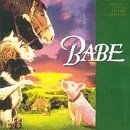
![]() Babe el Fish
Babe el Fish 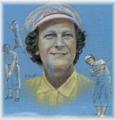 Babe Dikrikson Zaharias
Babe Dikrikson Zaharias 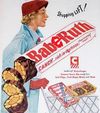 Babe Ruth candy bar
Babe Ruth candy bar  BayBuchannan, worshiped by Republicans
BayBuchannan, worshiped by Republicans
(trans. Babe the Fish)
See also[edit | edit source]
- Literary Criticism
- You have two cows/12
- Literary laboratory
- Literary Style
- Epic Poem
- Dark Ages
- Medieval
- Renaissance
- Poetry
- Novel
- Fiction
- Science Fiction
- Scientology
- Writer
- Charles Dickens
- James Joyce
- Plagerism
- All Your Base Are Belong To Us
- Monkey chained to a typing machine
- Forgotten Books of Dr. Seuss
- HowTo:Create fantastic fantasy characters and make a million-gazillion dollars
